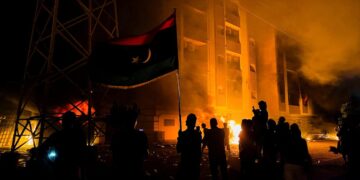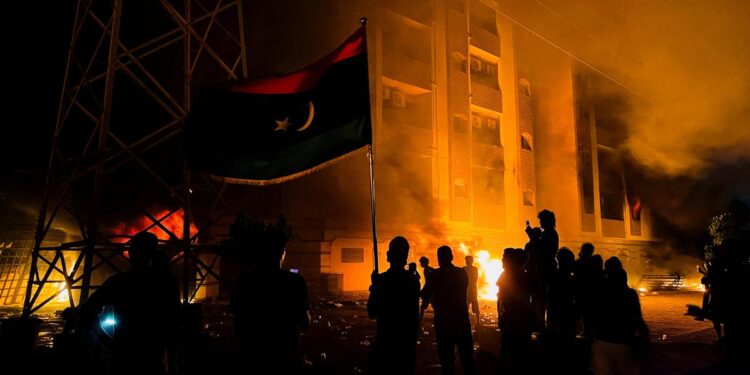By John Ikani
Protesters stormed Libya’s Parliament building in the eastern city of Tobruk on Friday, demonstrating against deteriorating living conditions and political deadlock, Libyan media reported.
Several television channels said that protesters had managed to penetrate the building and committed acts of vandalism, while media outlets showed images of thick columns of black smoke coming from its perimeter as angry young protesters burned tyres.
Other media reports said part of the building had been burned.
The Parliament building was empty as Friday falls on the weekend in Libya.
Libya’s Parliament, or House of Representatives, has been based in Tobruk, hundreds of kilometres (miles) east of the capital Tripoli, since an east-west schism in 2014 following the revolt that toppled dictator Moamer Kadhafi three years earlier.
A rival body, formally known as the High Council of State, is based in Tripoli.
Images Friday showed that a protester driving a bulldozer had managed to smash through part of a gate, allowing other demonstrators to enter more easily, while cars of officials were set on fire.
Later protesters began to break through the building’s walls with construction equipment.
Other protesters, some brandishing the green flags of the Kadhafi regime, threw office documents into the air.
Libya, sweltering in summer heat, has endured days of power cuts – a situation worsened by the blockade of key oil facilities amid the entrenched political rivalries.
“We want the lights to work,” chanted protesters, some of whom brandished the green flags of the Gaddafi regime.
The Parliament condemned the “acts of vandalism and the burning” of its headquarters.
The interim Prime Minister of the Tripoli-based government, Abdul Hamid Dbeibah, meanwhile voiced support for the protesters’ concerns in a Twitter message.
The two governments have been vying for power in Libya for months: the one based in Tripoli, led by Dbeibah, and the other headed by the former interior minister Fathi Bashagha, who was appointed by the parliament and is supported by the eastern-based warlord Khalifa Haftar.
Haftar’s forces control major oil facilities.
The prospect of elections appears as distant as ever since the parliament appointed Bashagha, arguing that Dbeibah’s mandate had expired.
After Bashagha failed to enter Tripoli in May, the rival administration took up office further east, in Sirte, Gaddafi’s coastal hometown.
There have been repeated skirmishes between armed groups in Tripoli, prompting fears of a return to full-scale conflict.
Presidential and parliamentary elections, originally set for last December, were meant to cap a UN-led peace process following the end of the last major round of violence in 2020.
However, the vote was never held because of several contentious candidacies and deep disagreements over the polls’ legal basis between the rival power centres.

































